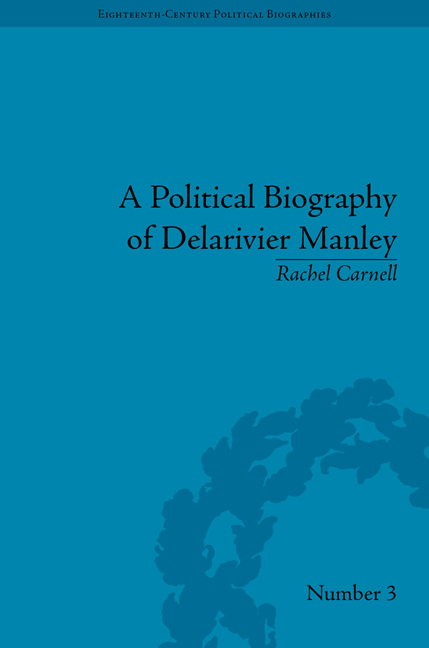Book contents
- Frontmatter
- CONTENTS
- The Author
- Dedication
- Acknowledgements
- A Note on Dates
- Manley Family Tree
- Introduction
- 1 ‘A Long Untainted Descent’: Her Father's Daughter?
- 2 Roger Manley: ‘A Scholar in the Midst of a Camp’
- 3 A ‘Liberal Education’: Youth and Early Life in London
- 4 A ‘Female Wit’: 1694–6
- 5 ‘Some More [and Less] Profitable Employ’: 1697–1705
- 6 Not Yet a Propaganda Writer: 1705–8
- 7 ‘[T]hrowing the First Stone’: 1709
- 8 Writing under a Tory Ministry: 1710–14
- 9 A Celebrated ‘Muse’: 1714–24
- Notes
- Works Cited
- Index
7 - ‘[T]hrowing the First Stone’: 1709
- Frontmatter
- CONTENTS
- The Author
- Dedication
- Acknowledgements
- A Note on Dates
- Manley Family Tree
- Introduction
- 1 ‘A Long Untainted Descent’: Her Father's Daughter?
- 2 Roger Manley: ‘A Scholar in the Midst of a Camp’
- 3 A ‘Liberal Education’: Youth and Early Life in London
- 4 A ‘Female Wit’: 1694–6
- 5 ‘Some More [and Less] Profitable Employ’: 1697–1705
- 6 Not Yet a Propaganda Writer: 1705–8
- 7 ‘[T]hrowing the First Stone’: 1709
- 8 Writing under a Tory Ministry: 1710–14
- 9 A Celebrated ‘Muse’: 1714–24
- Notes
- Works Cited
- Index
Summary
In a letter written in the summer of 1714 to Robert Harley, Earl of Oxford, Manley ‘most humbly’ asks Harley's opinion of a plan she has for a pamphlet offering ‘a true account of the Changes made just Before the Death of the Queen’. These ‘Changes’ would have included Oxford's own dismissal from office two weeks before Anne's death. Having served since 1710 as Chancellor of the Exchequer and since 1711 as Lord Treasurer, Oxford had been Queen Anne's chief (or de facto ‘prime’) minister for four years. Moreover, by recruiting ‘some of the most prominent and most effective pamphleteers of his age’, he had over the previous decade helped create what J. A. Downie has described as a ministerial ‘propaganda machine’. Manley herself had been part of that propaganda machine since the spring of 1711, when she was asked by Jonathan Swift to write pamphlets on various topics of interest to the Oxford ministry (including one about the 1711 assassination attempt against Harley) and when she was subsequently asked to take over the Examiner, which Swift had previously authored.
As is evident from her August 1714 letter to Oxford, however, Manley considered herself more than a mere subcontractor to her friend Swift, ‘cook[ing] … in her own style’ six-penny pamphlets he either ‘had not time to do himself ’ or else was not willing to write in such a way as would satisfy Oxford. In her August 1714 letter, Manley suggests, as an organizing analogy for her proposed pamphlet, a scene from Dampier about ‘the Queen of Achins Court & Country’ which she believes would help ‘sett those men right [about Oxford] who only condemn for want of information’. In other words, by the summer of 1714 Manley was obviously confident enough in her own skill at designing political propaganda to make a suggestion directly to Oxford, on whom she had waited in late May 1714 while he was still in office.
- Type
- Chapter
- Information
- A Political Biography of Delarivier Manley , pp. 159 - 190Publisher: Pickering & ChattoFirst published in: 2014



